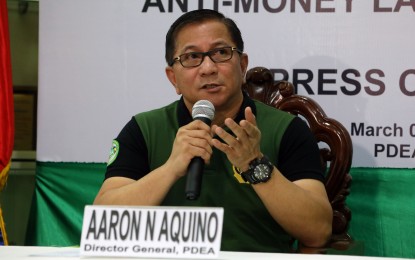
MANILA -- The Philippines and China discussed ways to boost cooperation on intelligence and investigation of drug cases during the 3rd Bilateral Meeting on Drug Control Cooperation hosted by the Philippine Drug Enforcement Agency (PDEA) at the South Palms Resort in Panglao, Bohol on May 20-23.
Aaron N. Aquino, the PDEA director general, spearheaded the Philippine delegation, mostly PDEA officials, while the Chinese contingent was led by Deputy Secretary General Zhang Meirong of the Office of the National Narcotics Control Commission (ONNCC) and Commissar of the Narcotics Control Bureau (NCB) under Ministry of Public Security (MPS) of the People’s Republic of China (PRC).
Aquino said other topics discussed during the four-day bilateral meeting were current drug trends and situations affecting both countries, updated information on the cases of drug personalities jointly investigated by both agencies, and best practices and actionable programs in the field of preventive drug education and law enforcement.
He said the holding of the bilateral meeting is in accordance with the Protocol on Cooperation signed between PDEA and its Chinese counterpart agencies in Beijing, China on Oct. 20, 2016 to effectively suppress and control drug crimes between the two nations.
Under the Protocol, which is in effect for five years, the Philippines and China agreed to establish and maintain cooperation involving information, data intelligence exchange and investigation on drug crimes, assistance in the repatriation of drug criminals, and exchange and training of narcotics investigators.
Joint training programs on drug law enforcement and customs control and shared investigations on drug trafficking and abuse were also conducted in different key cities of China, such as Yunan province, Guandong province, Fuzhou City, Hangzhou City, Beijing, and Shanghai.
The PRC donated laboratory equipment, such as the Liquid Mass Combination Instrument, to PDEA’s Laboratory Service, thus augmenting the agency’s forensic examination capabilities.
Aquino thanked the Chinese government for the equipment and free training courses that boosted the agency’s crusade against the trafficking of the bulk supply of illegal drugs in the country, perpetrated by drug cartels and international drug trafficking organizations.
“We need all the support we can gather from our neighboring countries, particularly in terms of cross-border law enforcement and customs control,” he added.
The series of bilateral meetings also helped foster close cooperation and timely coordination between PDEA and the ONNCC, NCB, MPS that led to the discovery of a large-scale shabu laboratory inside a farm in Barangay Santo Niño, Ibaan, Batangas.
The two countries’ strengthened cooperation has also resulted in the dismantling of the country’s first-ever illegal facility used in the manufacture of the party drug, ecstasy, in Barangay Tinajeros and a small-scale clandestine laboratory used in the manufacture of liquid shabu in Barangay Santolan, both in Malabon City, and the neutralization of a clandestine laboratory inside a luxurious residential condominium in Pasay City.
The Philippines and China started their cooperation against illicit trafficking and abuse of psychotropic substances and precursor chemicals in 2001 through the signing of a memorandum of agreement between the Department of Foreign Affairs and the MPS.
“The Filipino and Chinese cultures and traditions may dictate different approaches and diversities. We may be geographically separated and speak different languages, but we share the same vision of a world free from the clutches of illegal drugs,” Aquino said. (PNA)
